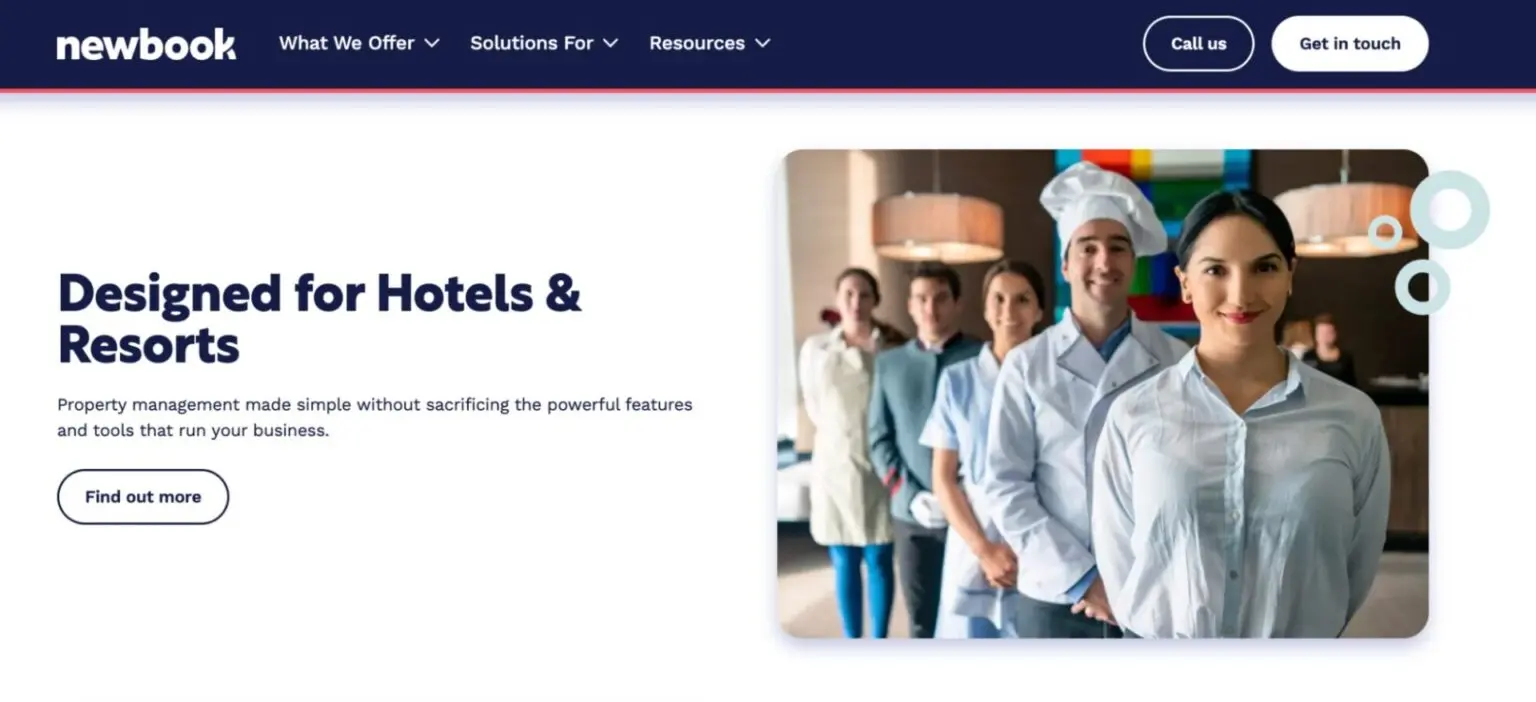Why is centralized data management important in the hospitality industry? Well, imagine that you have to manually manage incoming reservations from your website and the OTAs you list with. How would you even begin to ensure that you don’t end up with double-bookings, and that your prices are accurate across all these different channels? It would be a full-time job in and of itself, and then some. Plus, what happens when you grow and list with more channels and decide to open a second, maybe third, location? Also, what happens when a guest books a room in the middle of the night on one platform, and then another guest books the same room on a different platform minutes later because the availability wasn’t updated? Now you’ve got to contend with double bookings and cancellations.
All accommodation providers use a variety of different tools for managing their hotels effectively. At the core of these tools is guest information—specifically reservations, that influence when room or unit cleanings happen, inventory pricing, guest experience enhancements (i.e., a bottle of wine waiting in the room for when a newlywed couple arrives, or an add-on for breakfast in bed), and much more. A CRS hotel ensures that every one of those systems, includes the property management system (PMS), revenue management software, and channel manager.
In this article, we explore the ins and outs of CRS hotel in hotel management, including functions, implementation, and advanced features and integrations.
What Is Central Reservation System in Hotel Management

A central reservation system (CRS) is a computerized system used by hotels and hospitality organizations to efficiently manage room bookings and reservations. It is a centralized platform that consolidates and manages hotel availability, pricing, and reservation data into one core experience. Utilizing a CRS hotel allows accommodation providers to streamline their reservation processes, improve guest experiences, and optimize revenue management.
Key Benefits of a CRS
| Benefit | Description |
|---|---|
| Centralization | -A CRS hotel consolidates booking information from various sources, including the hotel’s direct booking channels, OTAs, and global distribution systems (GDS). This centralization helps in managing reservations more efficiently and provides a single source of truth for availability and pricing. |
| Efficiency | -By automating many of the reservation tasks, a hotel CRS reduces manual effort and minimizes errors, allowing hotel staff to focus on providing excellent guest service. |
| Scalability | -As hotels expand, a hotel CRS can easily accommodate additional properties and services, ensuring consistent management across multiple locations. |
Functions of a Hotel CRS System
A CRS is a crucial tool in the hospitality industry, acting as the central hub that connects all hotel management systems to facilitate seamless data access and coordination. Here’s a detailed look at how a hotel central reservation system operates and its core functionalities:
1. Integration with Property Management Systems (PMS)
The integration of hotel CRS software with a PMS is fundamental to providing a holistic management solution for hotels. This integration ensures that all data related to reservations, guest profiles, and availability is synchronized between the CRS and the PMS, which is essential for maintaining accurate and up-to-date records in real time.
- Unified Data Management: A seamless connection between the hotel CRS software and PMS ensures that all information about room availability, guest details, and bookings is consistent across both platforms. This synchronization minimizes the risk of double bookings and overbookings by keeping all data aligned in real-time.
- Enhanced Operational Efficiency: With integrated systems, hotel staff can efficiently manage reservations, from initial booking to check-in and check-out, without having to manually update multiple systems. This accessibility to real-time information allows staff to focus on delivering high-quality guest services, as all necessary data is readily available.
2. Booking Management
A hotel central reservation system is critical to managing both direct bookings and reservations from third-party channels. It offers a comprehensive view of all hotel reservations through a single platform.
- Direct Bookings Management: The hotel CRS software enables hotels to manage bookings made directly through their own channels, such as their website, front desk, and mobile apps. This centralized system ensures a smooth and efficient booking process for guests, enhancing their overall experience from the first point of contact.
- Third-Party Reservations Coordination: By integrating with OTAs and GDS, a CRS consolidates reservations from external channels, maintaining consistency in inventory and pricing across all platforms. This ensures that the hotel’s availability and rates are always up-to-date, reducing discrepancies and improving market reach.
Your all-in-one, online booking system
Newbook is your all in one online booking system. Talk to us today to learn how you can improve operations and increase booking for your business.


3. Real-Time Inventory Management
A CRS provides real-time updates on room availability across all distribution channels, ensuring that inventory is accurately represented and optimized for maximum sales potential.
- Automated Availability Management: As bookings are made or canceled, the CRS hotel automatically updates room availability across all channels, preventing overbookings and maximizing occupancy. This automated process eliminates manual errors and ensures that every room is utilized effectively.
- Comprehensive Channel Management: By synchronizing inventory across all sales channels, including OTAs, GDS, and the hotel’s direct booking platforms, a CRS ensures that potential guests always have access to the most current availability and pricing information. This transparency enhances the likelihood of securing bookings by providing guests with reliable information.
4. Rate Management
The CRS is instrumental in managing dynamic pricing and optimizing revenue strategies for hotels, allowing them to respond quickly to market conditions and demand fluctuations.
- Dynamic Pricing Capabilities: A CRS empowers hotels to adjust room rates dynamically based on a variety of factors, such as demand levels, seasonal trends, and competitor pricing. This flexibility in pricing strategy helps hotels maximize revenue potential by aligning room rates with real-time market conditions.
- Revenue Optimization Tools: By analyzing booking patterns, market trends, and historical data, the CRS provides insights that help hotels implement effective pricing strategies. These strategies can be fine-tuned to optimize both occupancy rates and revenue, ensuring that hotels capitalize on high-demand periods while maintaining competitiveness during low-demand times.
Advantages of a Central Reservation System in Hotel Operations

A CRS hotel system offers numerous benefits to accommodation providers, helping them streamline operations, enhance guest satisfaction, and optimize revenue. Here are some of the key advantages:
1. Increased Efficiency
- Automation of Tasks: A CRS automates various tasks associated with booking management, such as updating room availability, processing reservations, and adjusting rates. This automation reduces the manual workload for hotel staff, allowing them to focus on providing exceptional service to guests.
- Centralized Management: By consolidating all reservations and booking information into a single platform, a CRS eliminates the need for manual data entry and reduces the risk of errors. This centralization ensures that staff can manage reservations more efficiently, saving time and resources.
- Seamless Integration: Integration with PMS and other hotel software systems ensures smooth operations across departments, further enhancing efficiency.
2. Enhanced Guest Experience
- Real-Time Availability: A CRS provides guests with accurate, real-time information about room availability and pricing, allowing them to make informed booking decisions quickly and easily.
- Personalized Services: By leveraging guest data stored in the CRS, hotels can offer personalized services and experiences that cater to individual preferences, increasing guest satisfaction and loyalty.
- Streamlined Booking Process: The CRS simplifies the booking process, providing guests with a seamless experience whether they book directly through the hotel’s website or via third-party channels.
3. Better Data Management
- Consolidated Data: A CRS collects and centralizes data from all booking channels, providing hotels with a comprehensive view of reservations, guest preferences, and market trends.
- Data-Driven Insights: By analyzing data from the CRS, hotels can gain valuable insights into booking patterns, guest behavior, and market demand. These insights can inform strategic decision-making and help hotels tailor their services to meet evolving guest needs.
- Improved Reporting: The CRS generates detailed reports on occupancy, revenue, and performance metrics, enabling hotels to monitor their operations and make informed decisions to improve performance.
4. Revenue Optimization
- Dynamic Pricing: A CRS hotel system allows hotels to implement dynamic pricing strategies that adjust room rates based on real-time demand, market trends, and competitor pricing. This flexibility helps maximize revenue by ensuring that prices reflect current market conditions.
- Maximized Occupancy: By optimizing inventory distribution across all channels, CRS hotel reservations help accommodation providers increase occupancy rates and reduce the likelihood of unsold rooms.
- Targeted Promotions: The CRS enables hotels to design targeted promotions and special offers based on guest data and market insights, attracting more bookings and increasing revenue.
5. Scalability
- Adaptability: A CRS hotel system is designed to accommodate a hotel’s growth, allowing for the easy addition of new properties, room types, and services as the business expands.
- Flexible Features: As hotels grow and market demands change, a CRS hotel can be easily updated and customized to meet new requirements, ensuring that it continues to support business objectives effectively.
- Support for Multiple Locations: A CRS hotel provides centralized management across multiple locations, ensuring consistent operations and brand standards for hotel chains and groups.
Implementation of Hotel CRS Systems

Implementing a central reservation system in hotel management requires careful planning, execution, and ongoing support to ensure success. By following structured implementation steps and proactively addressing common challenges, hotels can leverage the benefits of a CRS to enhance efficiency, improve guest experiences, and drive revenue growth.
Steps to Implementation: From Planning to Deployment and Training
1. Needs Assessment and Planning
- Identify Objectives: Begin by defining clear goals for your CRS implementation. These could include increasing booking efficiency, reducing manual errors, improving guest experience, or optimizing revenue. Establishing these objectives helps guide the selection process and ensures alignment with overall business goals.
- Evaluate Options: Research different CRS vendors, comparing their features, scalability, integration capabilities, and costs. Consider how each system aligns with your hotel’s needs and long-term objectives. Conduct demonstrations and seek input from industry peers to inform your decision.
- Stakeholder Involvement: Engage key stakeholders from various departments, such as management, IT, sales, and front-line staff, to gather input and foster collaboration. Involving stakeholders early ensures their buy-in and helps identify potential issues or needs specific to each department.
2. System Selection and Customization
- Choose a CRS Vendor: Select a vendor that offers a system tailored to your hotel’s specific needs, with robust support and training resources. Consider the vendor’s reputation, customer support, and ability to provide ongoing updates and improvements.
- Customize Features: Work with the vendor to customize the CRS according to your hotel’s unique requirements. This could include integrating specific booking channels, configuring dynamic pricing rules, and designing a user-friendly interface that aligns with your brand identity.
3. Integration with Existing Systems
- PMS Integration: Ensure seamless integration with your PMS and other software systems, such as customer relationship management (CRM) and revenue management systems. This integration is crucial for maintaining accurate data flow and operational efficiency across departments.
- Channel Management: Integrate the CRS with OTAs, GDS, and your hotel’s direct booking channels. This ensures real-time updates of inventory and pricing, preventing overbookings and ensuring consistency across platforms.
4. Testing and Quality Assurance
- Conduct Testing: Before going live, extensive testing of the CRS is recommended to ensure all functionalities work as expected. This includes booking processes, data synchronization, rate management, and reporting capabilities. Testing helps identify potential issues and ensures a smooth transition.
- Identify Issues: Address any technical issues or discrepancies uncovered during testing. Collaborate with your vendor’s technical team to resolve these challenges and fine-tune the system for optimal performance.
5. Training and Deployment
- Staff Training: Provide comprehensive training for hotel staff, focusing on how to use the CRS effectively. Training should cover system navigation, booking management, rate updates, and troubleshooting common issues. Ensure all departments are comfortable with the system before it goes live.
- Go Live: Deploy the CRS hotel during a period of low activity to minimize disruption. Monitor the system’s performance closely, providing immediate support to staff and guests as needed to ensure a smooth transition.
6. Ongoing Support and Evaluation
- Continuous Support: Establish a support system with the CRS hotel vendor to address any issues post-deployment. Regularly update the system to incorporate new features and improvements, ensuring it remains aligned with your hotel’s evolving needs.
- Evaluate Performance: Continuously assess the CRS’s performance against your original objectives. Use data and feedback to identify areas for improvement and optimize the system’s use to maximize benefits.
Challenges and Solutions: Common Issues Faced During Implementation and How to Overcome Them
During the implementation process, many accommodation providers will come across common challenges. It’s important to be aware of these challenges so that you can take action to mitigate them before they become a real problem. Here are some common issues that you may face during the implementation of your hotel CRS system:
1. Integration Challenges
- Problem: Integrating the CRS with existing systems can be complex, leading to data inconsistencies or operational disruptions.
- Solution: Work closely with your vendor’s technical team to ensure seamless integration. If necessary, use middleware solutions to facilitate data flow between systems. Conduct thorough integration testing and use a phased rollout approach to minimize disruptions.
2. Data Migration Issues
- Problem: Transferring data from old systems to the new CRS can result in data loss or corruption.
- Solution: Develop a detailed data migration strategy, including data backup and validation processes. Conduct test migrations to identify potential issues and ensure data integrity. Work with your vendor to implement robust data validation and cleaning techniques.
3. Staff Resistance and Training
- Problem: Employees may resist adopting a new system or struggle with its complexity.
- Solution: Involve staff in the implementation process early on to increase buy-in. Provide comprehensive training and ongoing support, including access to user manuals, online resources, and dedicated support channels. Highlight the CRS’s benefits to staff to encourage adoption.
4. Cost Overruns
- Problem: Unexpected costs can arise during implementation, straining budgets.
- Solution: Develop a detailed budget that accounts for all aspects of implementation, including training, integration, and ongoing support. Negotiate with vendors to ensure transparency in pricing and seek cost-effective solutions for customization and support.
5. System Downtime
- Problem: Downtime during the transition can disrupt operations and affect guest satisfaction.
- Solution: Schedule implementation during off-peak times to minimize impact. Ensure backup systems are in place to maintain continuity of service. Plan for a phased rollout to reduce the risk of prolonged downtime.
6. Customization Delays
- Problem: Customizing the CRS hotel to meet specific needs can lead to delays in deployment.
- Solution: Clearly define customization requirements early in the planning stage and work closely with the vendor to ensure timely delivery of custom features. Establish clear timelines and milestones to track progress and address delays promptly.
Why Newbook is the Best Hotel CRS Provider

Let’s take a closer look at Newbook. It’s a complete property management software offering that focuses on centralizing the information you need to run your accommodation business well. Newbook consists of the following software components:
- A centralized reservations system that feeds direct bookings from your website, front desk, and OTAs into one calendar so that you can see your available inventory at a glance.
- Built-in channel management software for managing your OTA listings
- Revenue management software to adjust your dynamic pricing strategy and manage your accounting needs
- An integrations store so that you can easily connect other accommodations management software to your CRS
Newbook’s cloud-based platform makes it super convenient to access your hotel’s system and information from anywhere you have an internet connection. Whether you’re checking in on one of your hotels or working remotely, you can stay productive without any hassle.
We understand that data security in the cloud is a big concern for hotel owners, and that’s why we go the extra mile to keep your information safe. We use Amazon Web Services to store your data securely within the United States, and we’ve built a robust infrastructure that includes top-notch encryption, threat anomaly detection, and regular penetration testing. This means your data and your guests’ information are well protected.
When it comes to reliability, Newbook is in a league of its own with an impressive 99.99% uptime rating, which is way above the industry standard. It might seem like just a tiny difference, but it actually makes a huge impact:
| Reliability Rating of CRS Hotel Software | Translation |
|---|---|
| 99% | -3 days, 15 hours, and 39 minutes of downtime annually |
| 99.99% (Newbook) | -52 minutes and 35 seconds of downtime annually |
This little percentage bump translates to a lot more reliability, showing how committed we are to keeping your business running smoothly with minimal disruptions.
So you manage a hotel? We make it easy
Newbook is your all in one hotel management software. Talk to us today to learn how you can improve operations and increase bookings for your hotel.


Conclusion
A Central Reservation System (CRS) is no longer a luxury but a necessity for modern accommodation providers. A CRS hotel streamlines and centralizes all booking-related activities, which is crucial for managing reservations efficiently across multiple channels. This not only prevents issues like double bookings and inaccurate pricing but also frees up your team to focus on delivering exceptional guest experiences.
By implementing CRS hotel software, accommodation providers can effortlessly integrate their PMS, optimize revenue through dynamic pricing, and ensure real-time inventory management. This integration helps maintain consistent data, facilitating better decision-making and enhancing operational efficiency. With a system like Newbook, which boasts a high uptime reliability and robust security measures, hotels can ensure that both their operations and guest data remain secure and uninterrupted.
The journey to implementing a hotel CRS system might come with challenges, such as integration complexities and staff adaptation, but these can be mitigated with careful planning, thorough testing, and comprehensive training. Ultimately, a well-implemented CRS not only elevates the efficiency and accuracy of hotel operations but also significantly improves the overall guest experience, driving loyalty and revenue growth. With the right system in place, accommodation providers are well-equipped to navigate the complexities of modern hotel management and stay ahead in the competitive hospitality landscape.
Discover how Newbook’s hotel CRS can help you democratize your accommodation business’s data, and boost productivity and efficiency. Reach out to us today for a demo.
eBook: Optimize Online Presence & Convert More Bookings
Unlock our expert tips to optimize your digital strategy through OTAs and social media, and boost conversions on your direct booking engine.



